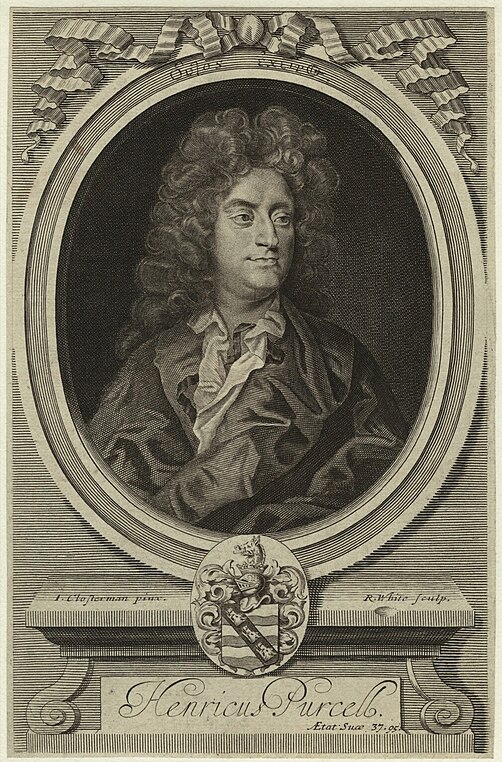“Welcome to all the pleasures that delight…”
So begins Henry Purcell’s first Ode to Saint Cecilia, commissioned by the newly-formed Musical Society of London in 1683. What a shame that we’re not dealing with this Ode here, because that would truly be a great introduction to the thread! Still, welcome indeed to June, and to my attempts to delight you with the pleasures of Purcell via his 1692 Ode, “Hail, Bright Cecilia”.
As you are no doubt aware, St Cecilia is the patron saint of music and musicians, and this provided solid subject matter for artists of all stripes. Paintings, sculptures, stained glass portray Cecilia playing a variety of instruments, but the most common seems to be the organ, as shown here in this nice picture courtesy of Wikipedia:

In his “A Song For St. Cecilia’s Day, 1687”, the poet Dryden went one better and seemed to suggest that Cecilia actually invented the organ, and notes its superiority over all the other instruments. As you can imagine, I concur completely! When the Musical Society returned to Purcell in 1692 to commission another Ode for the November 22nd feast day, Purcell set to music a libretto by Nicholas Brady, itself strongly inspired by Dryden’s work. Purcell wasn’t always blessed with the finest librettists (seriously, some of the other odes are lyrically DIRE!) but Brady (born in Co. Cork no less) did a pretty good job here. Purcell went to town with the extended musical forces available at the event and composed the largest-scale of all his Odes and Welcome Songs.
As such, “Hail, Bright Cecelia” can be a little daunting for those coming to this music for the first time, and some of the shorter odes might seem initially more attractive (indeed, the aforementioned “Welcome To All The Pleasures” would be one such example.) However, there’s a depth and variety here that really repays concentrated listening. Much like the previous months we’ll look at each of the movements in turn, but as always the whole is greater than the sum of the parts. Before we dive into the specifics, I’d encourage you to read Dryden’s poem (
http://www.bartleby.com/101/399.html) and then consider Brady’s libretto which I’ve included below. Later, we’ll delve into Purcell’s masterful word-setting, but I think it’s interesting to look at the words which inspire and shape this music in isolation. I don’t know whether I’m alone in this, but I rarely really *listen* to words in the classical sphere. However to ignore the words here is to miss the point entirely. For me, Purcell’s genius is in what he does with them.
Hail! bright Cecilia, Hail!
Fill ev'ry Heart With Love of thee and thy Celestial Art;
That thine and Musick's Sacred Love
May make the British Forest prove
As Famous as Dodona's Vocal Grove.
Hark, each Tree its silence breaks,
The Box and Fir to talk begin.
This is the sprightly Violin,
That in the Flute distinctly speaks.
‘Twas Sympathy their list'ning Brethren drew
When to the Thracian Lyre with leafy Wings they flew.
'Tis Nature's Voice; thro' all the moving Wood
Of Creatures understood:
The Universal Tongue to none
Of all her num'rous Race unknown.
From her it learnt the mighty Art
To court the Ear or strike the Heart:
At once the Passions to express and move;
We hear, and straight we grieve or hate, rejoiced or love;
In unseen Chains it does the Fancy bind;
At once it charms the Sense and captivates the Mind.
Soul of the World!
Inspired by thee,
The jarring Seeds of Matter did agree.
Thou did'st the scatter'd Atoms bind,
Which, by the Laws of true proportion join'd,
Made up of various Parts one perfect Harmony.
Thou tun'st this World below, the Spheres above,
Who in the Heavenly Round to their own Music move.
With that sublime Celestial Lay
Can any Earthly Sounds compare?
lf any Earthly Music dare, The noble Organ may.
From Heav'n its wondrous Notes were giv'n,
(Cecilia oft convers'd with Heaven).
Some Angel of the Sacred Choir
Did with his Breath the Pipes inspire;
And of their Notes above the just Resemblance gave,
Brisk without Lightness, without dulness Grave.
!
Wond'rous Machine!
To thee the Warbling Lute,
Tho' us'd to Conquest, must be forc'd to yield:
With thee unable to dispute.
The Airy Violin
And lofty Viol quit the Field;
In vain they tune their speaking Strings
To court the cruel Fair, or praise Victorious Kings.
Whilst all thy consecrated Lays
Are to more noble Uses bent;
And every grateful Note to Heav'n repays
The melody it lent.
In vain the Am'rous flute and soft Guitar,
Jointly labour to inspire
Wanton Heat and loose Desire;
Whilst thy chaste Airs do gently move
Seraphic Flames and Heav'nly Love.
The Fife and all the Harmony of War,
In vain attempt the Passions to alarm,
Which thy commanding Sounds compose and charm.
Let these amongst themselves contest,
Which can discharge its single Duty best.
Thou summ'st their diff'ring Graces up in One,
And art a Consort of them All within thy Self alone.
Hail! Bright Cecilia, Hail to thee!
Great Patroness of Us and Harmony!
Who, whilst among the Choir above
Thou dost thy former Skill improve,
With Rapture of delight dost see
Thy Favourite Art
Make up a Part
Of infinite Felicity.
Hail, bright Cecilia, Hail to thee!
Great Patroness of Us and Harmony!





